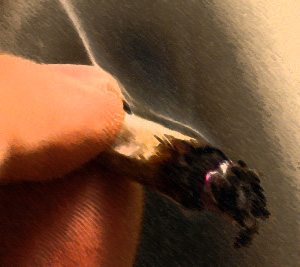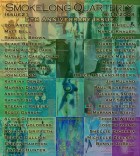Hi, Claudia! Thanks so much for your excellent story “Sugar.” As readers probably know, half of the stories in current issue of SmokeLong belong to past staff and guest editors. You guest edited issue 20. What did you, as an editor, look for in stories you selected for SmokeLong? What about your own story “Sugar” fits these criteria?
I looked for stories I loved. I looked for stories that stayed with me after I’d read them, that grabbed me and sank into me.
I can’t read my work the way I read others’ work; but when I went back and read this piece, over a year after I’d written it, I decided I liked it much more than I’d remembered liking it. It is an odd combination of whimsy and fear, of hope and cynicism. I think. The narrator seems very small, to my way of reading it. And the world around her is confusing and big. And her child, he’s looking to her to interpret that world.
“Sugar” puts me in mind of the story by Eudora Welty called “The Worn Path.” Do you know it? In it, an old woman travels through many dangers to buy medicine for her sick grandson. Although the dangers she faces are real, there is a definite fairy-tale or parable-like feel to the story, somewhat similar to yours. From what places do you draw your stories, the imagery that fills them? Do you walk around with a head full of colors? What makes fairy tales so engaging?
Oh, I had read that story! Years ago. And, when you asked me this question I went back and read it again. It is a gorgeous story, I think it may be my favorite Eudora Welty story. Yes, I do see what you mean, there is a definite fairy-tale feel to “A Worn Path”; it has a sense of love, of life and death, and their cycles, which puts me in mind of another story I love, “The Little Match Girl.” And after reading “A Worn Path” again—well, I see a lot there to remind me of “Sugar.” I noticed the significance of the coins, the way old Phoenix uses her nickels to buy her grandson a little windmill, which reminds me of “Sugar’s” cupcakes. Although the landscape she struggles against is tougher and harsher than the one the mother in my story is traveling, both women seem to be up against something neverending, something larger than themselves and the stories they occupy. I’m really glad you asked me this question, because it got me to read Eudora Welty again.
I wrote “Sugar” over a year ago. My husband had just recently lost his job, and we were trying to figure out what to do. Not long after he lost the job, I took my son to the big Whole Foods in Austin and bought him a very fancy cupcake; before that day, we’d only looked at those cupcakes. Not every story I write is taken so directly from a detail of my life, but this one was. Also, my son had and still has a fascination with robots. He used to like it when I’d get coins from the change machine at the laundromat. That entered this story.
I believe I was feeling scared when I wrote “Sugar”. When I sat down to write it, I had a hand full of words in front of me and I decided to repeat certain words throughout the piece. I wasn’t sure it would work but I think it did. When I was in high school, I spent a year writing Villanelles and I was thinking of them when I started this.
I adore fairy tales. I guess…hmm. Well, a good fairy tale makes me feel the way I feel when I look out at the ocean; I feel both larger and smaller than I do in ordinary life. They put me in touch with—well, it’s been awhile since I’ve read Carl Jung. I’m sure he said something like this and said it better, but they express some archaic loneliness and beauty, something I think a lot of children experience. I read recently that small children often experience vivid nightmares. That doesn’t surprise me. I recently took my son to the beach for the first time. As I watched him looking out at giant freighters and the sea meeting the horizon, I remembered how awestruck I was by that when I was a child, by how large the world was. I used to imagine the Astrodome filled with water, and I’d scare myself, but I also found the idea a little thrilling. Fairy tales are like that.
You have a young son, correct? How have you seen your writing change since you’ve become a mother? Has anything changed beyond the subject matter, perhaps in terms of style, syntax, language?
Oh, and here I already brought him up to you in the last question. I’m hard pressed to say exactly how it has changed, but I know it has. Watching him has brought back the intensity of my own childhood, something I didn’t realize I missed until he came along.
“Sugar,” with color and light, floats above something darker and not quite named. Is this what childhood is? Or, do kids know better? Are they better at naming, acknowledging the unknown thing? Is this what adulthood is?
I think you are onto something there. I think children, perhaps, are still absorbing everything around them, and we as adults have had to shut some of that world out. This brings me back to the story you mentioned, Eudora Welty’s “A Worn Path”. Old Phoenix seems to be keyed into that world you describe, the darker, unnamed world. She is very old, and maybe this is something the very old and the very young have in common. My narrator, she’s part of that adult world, the one that might not mistake a scarecrow for ghost the way Phoenix does; but, I’m not sure she is as resolute or determined as the old woman in Welty’s story.
Your question also brings me to the last line of my story. I recently read Joyce’s Araby again. I might not be remembering correctly, but I think it may have been on my mind as I wrote this piece. That story ends on the narrator’s childhood realization; this one, perhaps, ends on a mother’s. I am afraid for my son, yet, as a mother, I am constantly preparing him for a world outside me. The little boy could eat all the cupcakes in the world and still want. His mother knows that.
This issue marks SmokeLong‘s fifth anniversary, which has the staff thinking a lot about longevity and growth. There’s no denying the literary arena is fickle, with journals coming and going, writers shooting onto the scene then falling into a long hiatus, editors changing houses, agents merging, trends in what’s hot, what’s not. How do you, as a writer, endure the ups and downs? Have you experienced any setbacks? What measures have you taken to grow?
I thought a lot about this question, and typed out several paragraphs, then deleted them. Then typed more, and deleted them. I have come to the conclusion that what matters most, is the work itself. I work as hard as I can to make something read as true as I can make it. I’ve been finding homes for my stories for a few years now, but I still have moments when a part of me would like to hide what I’ve written, take it down from all the computer screens my stories might be occupying. Sometimes I feel like a relatively pretty actress with a shelf-life that’s running out, taking her clothes off for the camera. Not someone with the predatory, undeniable beauty of Angelina Jolie, but someone who might get laughed at. But, I keep putting myself and my work out there because I want people to read it. I’ve learned to trust my own voice, to go with my gut when it comes to my writing. I used to love it when someone loved my work and hate it when someone hated it. Now, I try to see it as something outside of myself… once it is out there, it isn’t just mine anymore.Once it’s out there, a part of me has already let it go.



 The core workshop of SmokeLong Fitness is all in writing, so you can take part from anywhere at anytime. We are excited about creating a supportive, consistent and structured environment for flash writers to work on their craft in a community. We are thrilled and proud to say that our workshop participants have won, placed, or been listed in every major flash competition. Community works.
The core workshop of SmokeLong Fitness is all in writing, so you can take part from anywhere at anytime. We are excited about creating a supportive, consistent and structured environment for flash writers to work on their craft in a community. We are thrilled and proud to say that our workshop participants have won, placed, or been listed in every major flash competition. Community works.